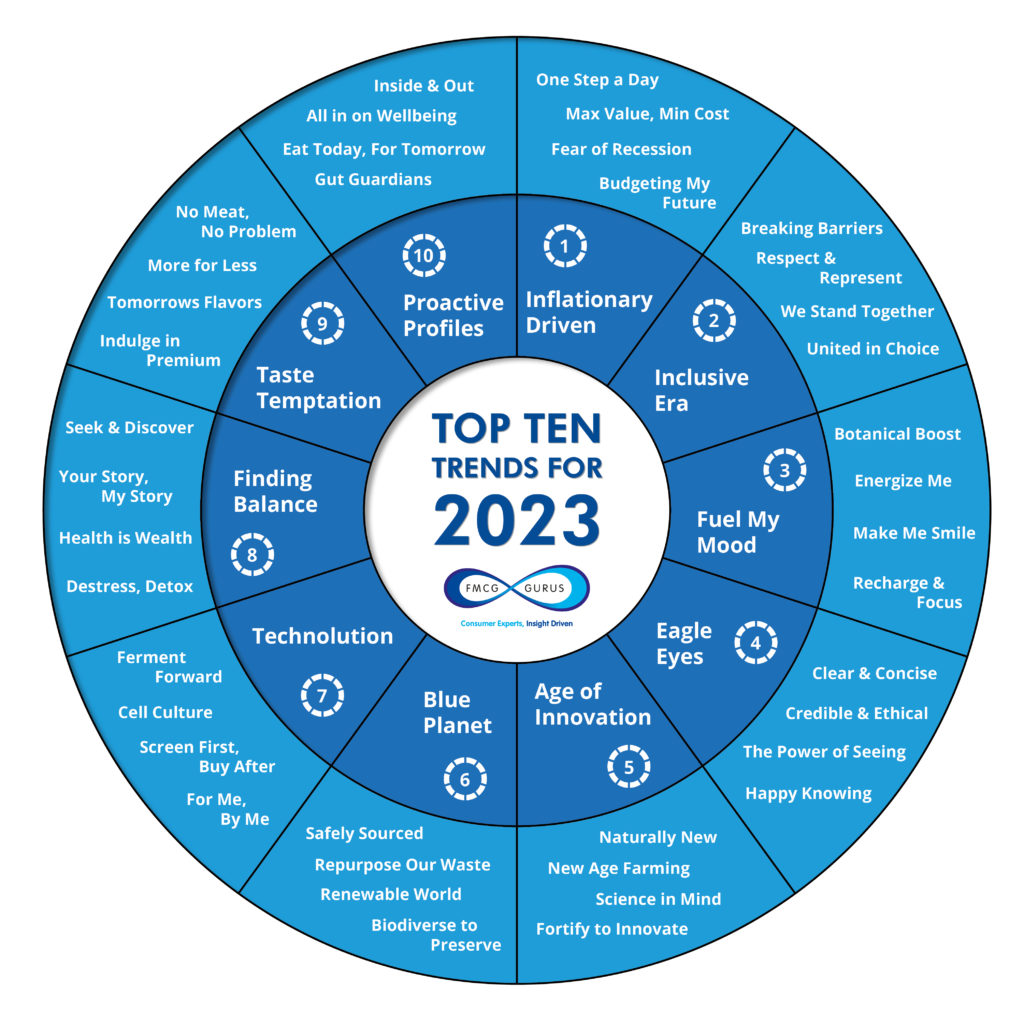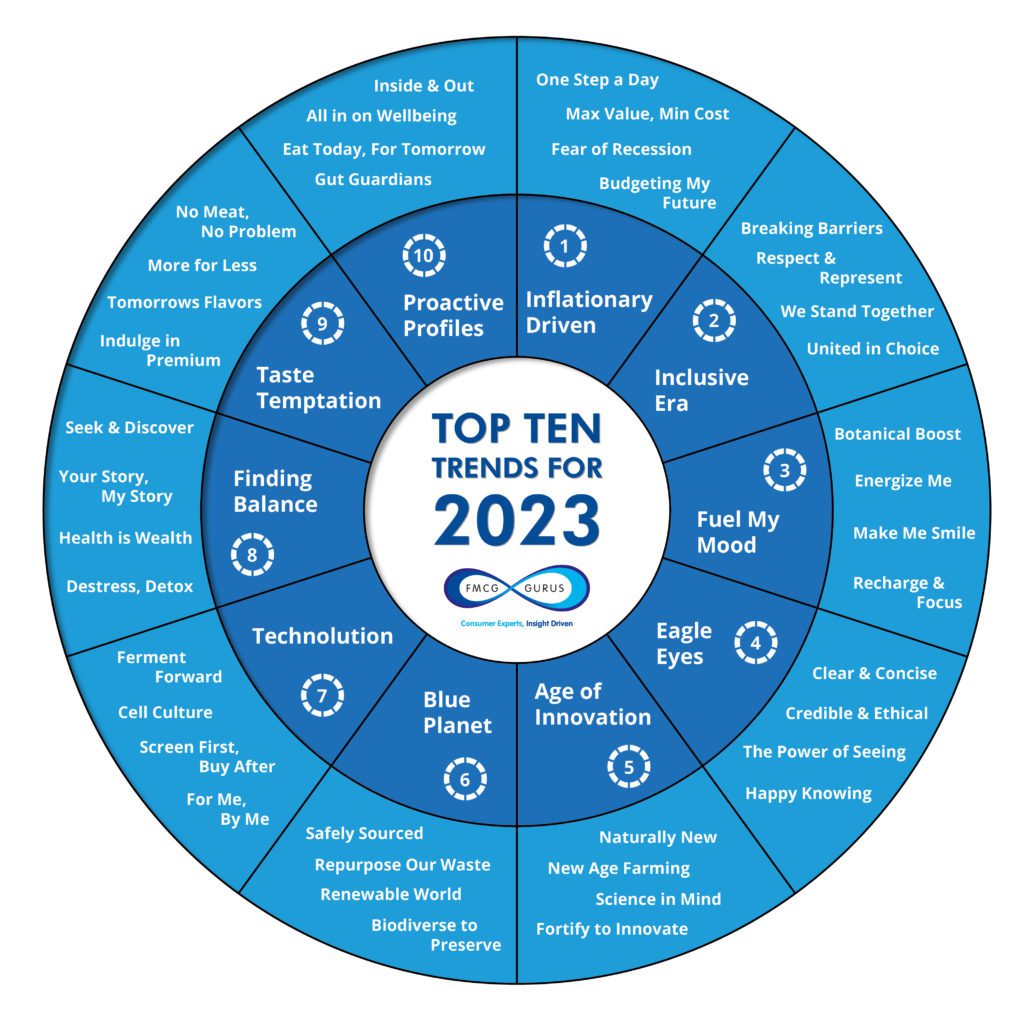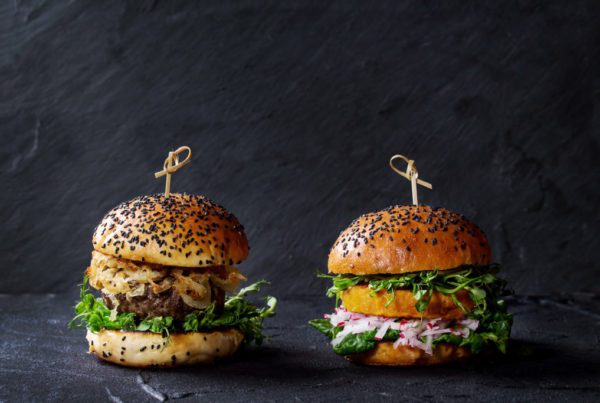Introduction
The Top Ten Trends FMCG Gurus have identified for 2023 are as follows: Inflationary Driven; Inclusive Era; Fuel my Mood; Eagle Eyes; Age of Innovation; Blue Planet; Technolution; Finding Balance; Taste Temptation; Proactive Profiles. This article will outline the properties of each profile and how we can expect consumers to interact with each trend.

Inflationary Driven
Consumers have entered another year in a high state of uncertainty and doubt. This year it is not down to the pandemic, but the economic down turn and cost-of-living crisis that has swept the globe. 2023 will be the year global consumers will look to maximise value for money and seek out products that satisfy their health and other personal needs, while engaging in recessionary shopping style habits and being more attentive to value.
Concerns of how much worse things will get before they get better impacts consumers when facing the cost-of-living crisis as prices continue to rise.
86% of global consumers said they felt shopping prices had risen in the last twelve months. Of these consumers 35% said that food and drink prices had increased by at least 6%. This has led consumers to be more mindful with their spending as they cannot absorb extra costs alongside the rise of other domestic and larger costs.
Consumers are not overly confident with their financial situation and struggle with everyday costs, leading to them adopting recessionary mindsets as the downturn of the economy leads to reduced job security and rising prices confronting consumers abruptly.
Inclusive Era
Consumers challenging societal norms is not a new phenomenon. Each generation deems itself to be more liberal than the previous generation and actively looks to break traditional lifecycle patterns and stereotypes associated with their demographic. However, what is increasingly noticeable, is that self-expression and identification are gaining more coverage and have more influence on everyday life.
From a food and drink perspective, consumers want products that they feel mirror their attitudes and outlook. This means breaking away from traditional marketing, which can often be deemed stereotypical and outdated, and instead, actively looking to address topical issues, creating the opportunity for people to re-evaluate their attitudes towards brands and categories. This is especially important in an era of social media and cancel culture, with consumers being willing to actively boycott and discredit brands and products that they feel are not behaving in a manner they deem ethical or correct.
The importance of self-expression means that consumers want to engage with other like-minded individuals they feel reflect their attitudes and opinions on life, something they want food and drink brands to help facilitate, especially for younger adults. One-way brands can do this is through live events that people would not be able to experience otherwise, bringing consumers who share the same sociocultural views together. This is something that can also create differentiation in an era where people want to interact with brands and help shape their practices and policies.
Fuel my Mood
Health and wellness will significantly influence consumption habits as consumers orientate their shop considering long-term health and wellbeing. Consumers are placing more emphasis on addressing their emotional wellness which influences their spending. Consumers will still want to seek small affordable indulgences with escapism having a significant impact on eating and drinking habits. With this, consumers will become more observant to the ingredients in the products they buy, to evaluate what will be best for them, price, and health wise.
Eagle Eyes
Consumers will continue to be attentive to ingredient listings within food and drink, wanting reassurance that ingredients are real and authentic and do not contain anything deemed as detrimental to their health and the wider environment. This will drive demand for free-from lists and streamlined ingredients, with a focus on recognized ingredients, so that people feel they can make an informed decision about the nutritional profile of a product.
Age of Innovation
Consumers are concerned about the implications of traditional farming practices and the impact this has on the wider environment in the long term. As consumers become more aware to the damage done to the planet, through agriculture consumers want reassurance that farming practices are resourceful and that any natural resources used are replenished.
This is resulting in the industry placing greater emphasis on new-age farming policies where production is natural, and steps are taken to protect damage to soil for instance. There is a higher demand for brands and manufacturers to adopt sustainable and environmentally friendly innovations to align with consumer attitudes to helping the planet.
Blue Planet
Consumers will look to ensure that products are fully used up before being replaced and make greater efforts to avoid food waste, creating the opportunity for innovations from a packaging perspective to help achieve this. For this reason, many people deem the topics of health and sustainability to be interlinked. This is something that is resulting in people adopting the notion of feeling good by doing good for themselves and the planet.
Technolution
Consumers can feel that there is lack of personalized products on the market for their specific need states. Consumers are becoming more conscious about their health. At the same time, they are becoming more cautious about the health and wellness market, often believing that products are too generic and not suited to their specific needs – something which will raise concerns over efficacy. Health is being seen as much more intricate and dependent to the individual.
As a result, consumers want more personalized products that are suited to their specific needs. Personalization, designed for the individual based on their specific needs, appeals to consumers. However, people must feel reassured that such products are credible, proven, transparent, and effective. Moreover, they must also be deemed affordable/fair value for money at a time when consumers are more conscious of spending. Brands and manufacturers should look to explore the personalization and education catered towards consumers and the innovations between technology and the food industry.
Finding Balance
Consumers want to enjoy indulgence and escapism regardless of the cost-of-living crisis. Over the next twelve months, brand and retailer loyalty will decline as people demonstrate a greater willingness to shop around to get more for their money. They will also engage in debit-credit consumerism, looking to save money on certain products to justify spending elsewhere. Consumers will look to take advantage of more promotional offers, which creates the opportunity for retailers to modernize traditional promotional techniques, to be more aligned with the needs of the consumer.
Taste Temptation
Consumers will be reluctant to give up products they see as essential small luxuries, but at the same time be mindful to their spending. While people will have to adjust their spending habits, it must be remembered that people tend to have a sense of self-entitlement when it comes to their shopping habits. For this reason, consumers will be reluctant to give up on products and services, even if deemed non-essential. This will herald a new era of resourcefulness, where consumers look for ways to make their money go further without having to make too much compromise.
Proactive Profiles
Consumers continue to take a proactive approach to health and wellness as they look to stay fit and active until as late in life as possible by improving and maintaining a well-balanced diet and lifestyle. Consumers are remaining conscious about exposure to germs, bacteria, and viruses and how capable their immune system is in protecting them. As a result, people focus on prevention over cure, looking to address health issues even if they are not suffering symptoms.
In addition, strong emphasis is being placed on holistic health, with people recognizing that all aspects of physical and emotional wellness are interlinked and impact each other. Globally, consumers have reported wanting to pay particular attention to their immunity and digestive health.




